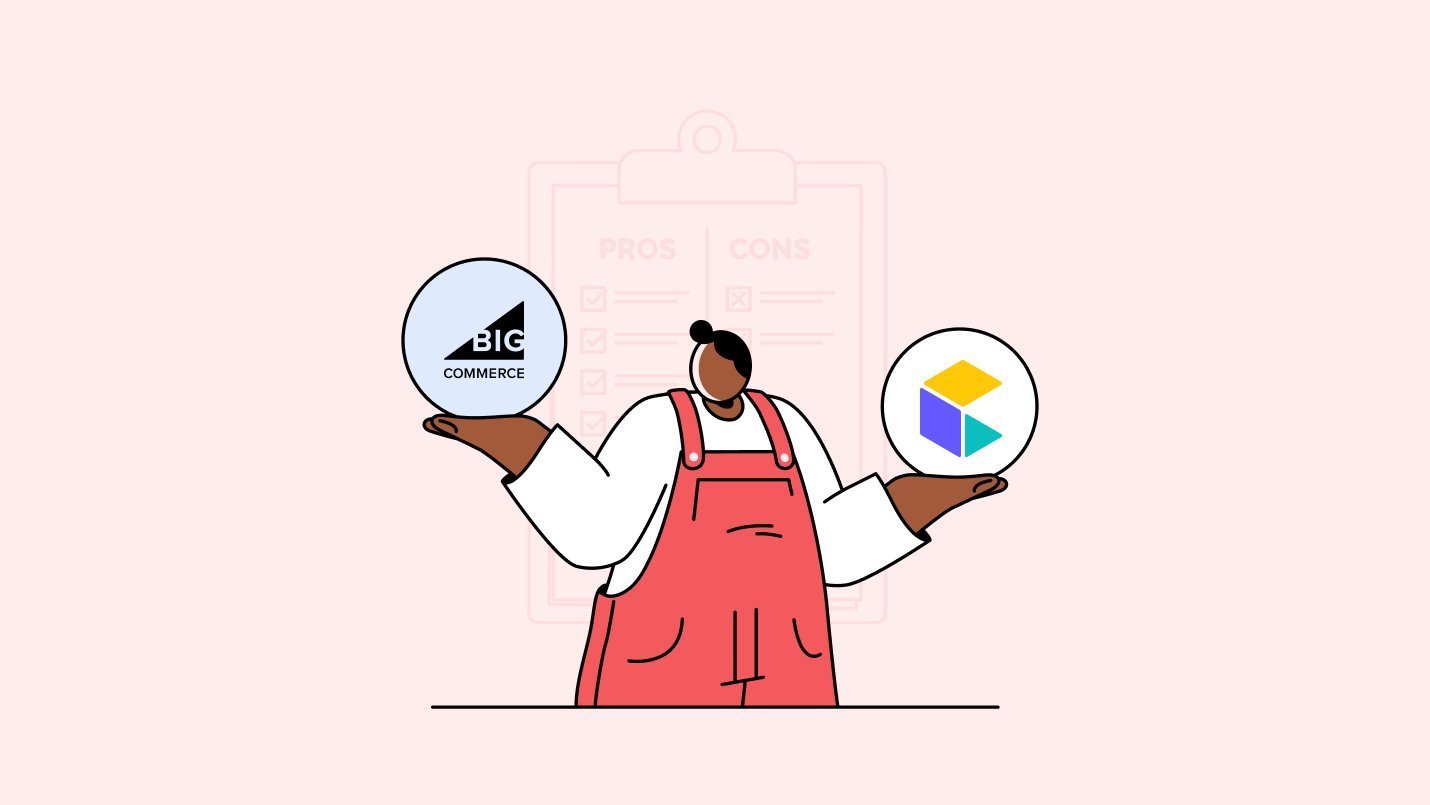The main difference between commercetools and BigCommerce is that commercetools began as a composable solution while BigCommerce is only now shifting in this direction from its headless origins, but is a more immature composable solution.
In this guide, you will find a full comparison between these two commerce solutions to see which is right for you, comparing:
- How you customize each platform
- The features, benefits and challenges of both commerce platforms
- The cost of commercetools vs BigCommerce
- When to choose BigCommerce or commercetools
Disclaimer: The information below is accurate as of November 22, 2024.
commercetools vs. BigCommerce: Pros & Cons
When evaluating eCommerce platforms, the most important factors when choosing an eCommerce platform can vary based on your needs and requirements, but we generally want to look at critical factors in scalability, features, and cost. Here is a quick high level of the pros and cons of commercetools vs. BigCommerce:
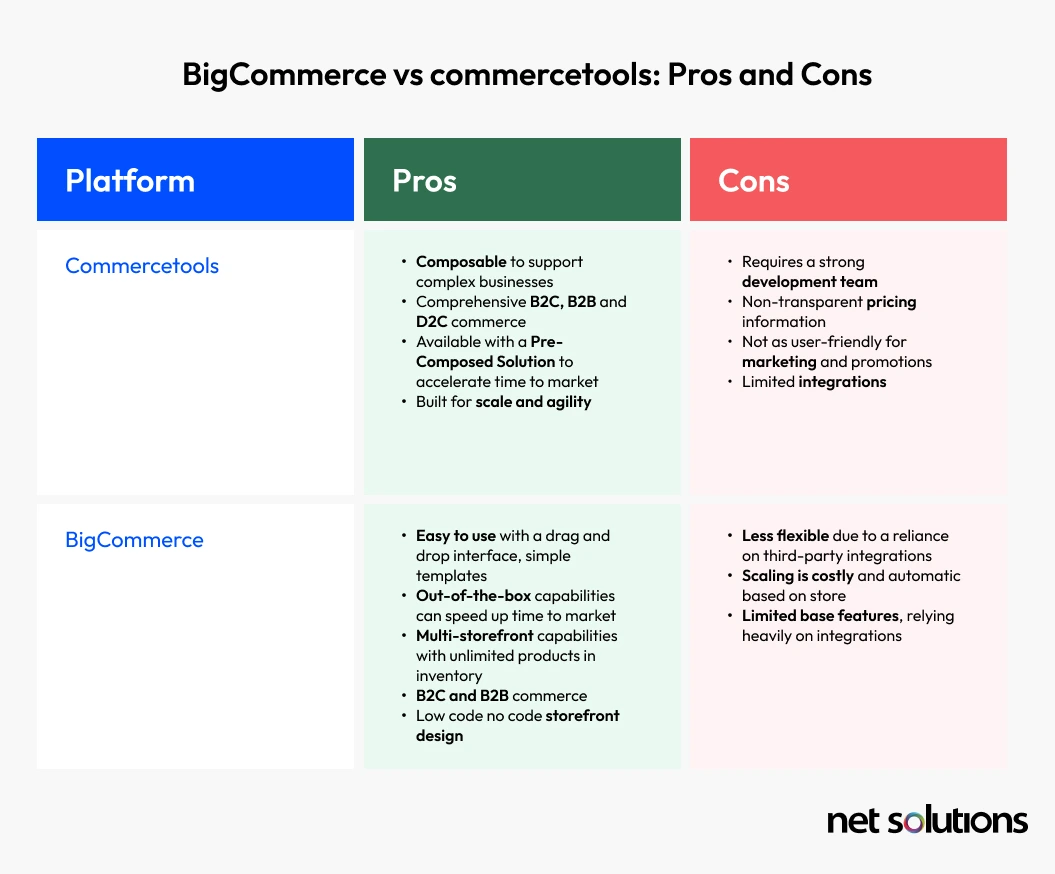
What is a composable eCommerce platform?
A traditional eCommerce platform is all-in-one, the least flexible option. A headless eCommerce system separates the front and backend layers of a system, but the backend and frontends remain as a single unified engine for each channel. In composable commerce, we break down both the backend and frontend into more independent and interchangeable pieces or components, allowing for greater customization. commercetools is a fully composable solution, while BigCommerce is moving from headless to composable.
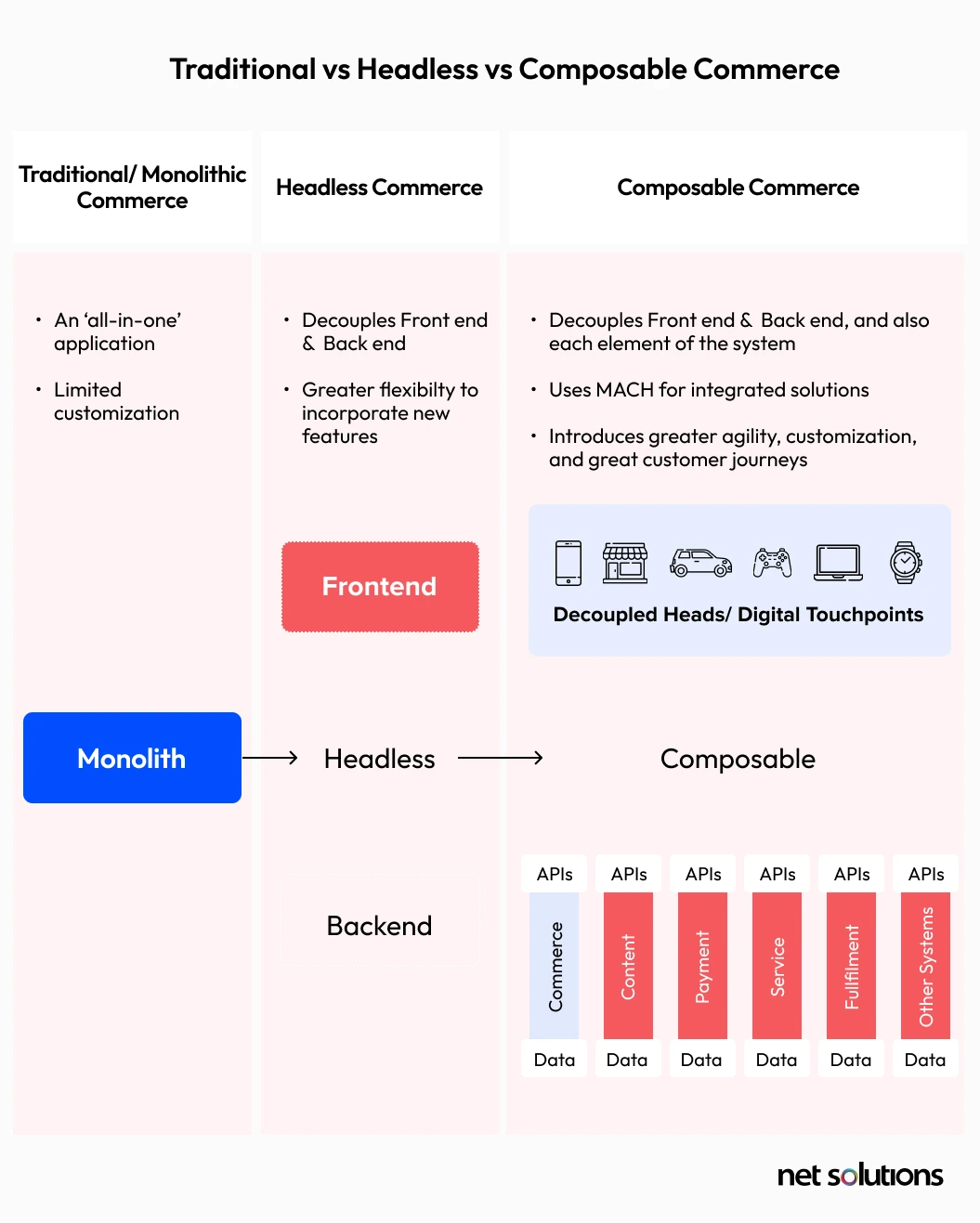
Advantages and disadvantages of commercetools
commercetools is an enterprise composable commerce platform, trusted by brands such as Bang & Olufsen and Woolworths. Recognized by Gartner as a leader in B2C and B2B commerce and the top scoring composable commerce platform, commercetools offers both the flexibility of a tech-agnostic composable platform as well as the ease of a pre-composed solution, Foundry.
Advantages of commercetools
Some of the reasons to like commercetools:
- Composable: choose the components, systems and features you need to power your commerce business. commercetools includes some hosted, pre-built integrations to accelerate common needs such as its out-of-the-box checkout component that comes with pre-integrated payment service providers.
- B2B & BC leader: A recognized leader in both B2B and B2C commerce, with pre-composed (Foundry) solutions for each vertical. B2B is strong and extends to various B2B+ business models.
- Strong catalog: catalog support is advanced, supporting more complex businesses.
- Scalable: A reliable and scalable solution, supporting huge traffic volume and making it easy to expand to new channels or regions. commercetools boasts a 99.999% uptime.
- Extensible: You can plug any service into commercetools, even those not listed by the platform, helping you truly tailor the capabilities.
If you’re a B2B business, be sure to also review our post on how to choose the right B2B eCommerce platform.
Disadvantages of commercetools
commercetools is a powerful tool, in the hands of a strong development team, but:
- Requires high development resources: any use of the flexibility of the non-Foundry composable solution will necessitate high development time
- Less intuitive: not as easy for non-technical users to understand, even within the pre-composed solution, offering fewer efficiencies or drag-and-drop capabilities to cater to marketing and business users
- Non-transparent pricing: commercetools does not disclose its pricing tiers or policies, but discloses its prices are “relatively higher” than the competition
Is commercetools the right fit for you?
commercetools is ideal for technically mature organizations that want a mature, highly customized technical environment with a large system of best of breed components to choose from.
Advantages and disadvantages of BigCommerce
BigCommerce is considered a challenger in the Digital Commerce space, by Gartner, but is straddling the border of shifting into a leadership position, trusted by brands including Badgley Mischka and Burrow. Up until August 2024, BigCommerce marketed itself as a headless commerce platform; in August, they announced the “Next Big Thing,” a series of innovative shifts in capabilities, including a shift to composable commerce.
Advantages of BigCommerce
BigCommerce is a chosen platform for many eCommerce stores for the following reasons:
- Ease of use: the top pro stated by many reviewers, due to the simple drag-and-drop interface and templates, making time to market rapid
- Starting price is low: low price and no hidden transaction fees or user costs, so a great starter option for growing businesses
- Strong multi-storefront capabilities: Known for its ability to handle multiple storefronts (brands, regions) from a single interface, reducing operational costs
- Integrated AI toolsets: these new capabilities set BigCommerce apart, including predictive analytics, product recommendations (Enterprise plans only), SEO product descriptions and metadata, B2B quotes assistance, semantic search and more.
- BigAI developer tools: BigCommerce is making its AI foundation app open-source to help you create new AI solutions. It also released the Big Open Data Layer to simplify data collection and take advantage of machine learning models.
Disadvantages of BigCommerce
Here are some of the challenges with BigCommerce:
- Composability is new: BigCommerce has been a leader in API-first headless commerce, but is only emerging in the composable space and is still most recognized as an easy headless SaaS solution. It is also not clear at this time if BigCommerce has truly decoupled its components or simply made more components available with APIs (not true composability). Note: the new Catalyst frontend requires self-hosting.
- Pricing: Scaling is automatic based on store sales volume, so margins can get tight unexpectedly. Further, some capabilities are locked behind higher tiers or are not built-in, increasing the overall spend.
- B2B limits: B2B is only included at the custom pricing level.
Want to learn more about eCommerce APIs?
Is BigCommerce the right fit for you?
BigCommerce is ideally suited for small to medium-sized businesses looking to start and scale an eCommerce store without the need for a huge development team or long time to market.
commercetools vs BigCommerce: Full Comparison
Rather than details the features of each platform, let’s dive right into comparing commercetools vs BigCommerce across some critical decision factors:
User-friendliness
BigCommerce wins this category, known for being user-friendly for technical and non-technical users. The Visual Editor is very intuitive to use with other user-friendly tools for customizing checkout and viewing reports.
commercetools also has a site builder, but it follows a less-intuitive nested interface.
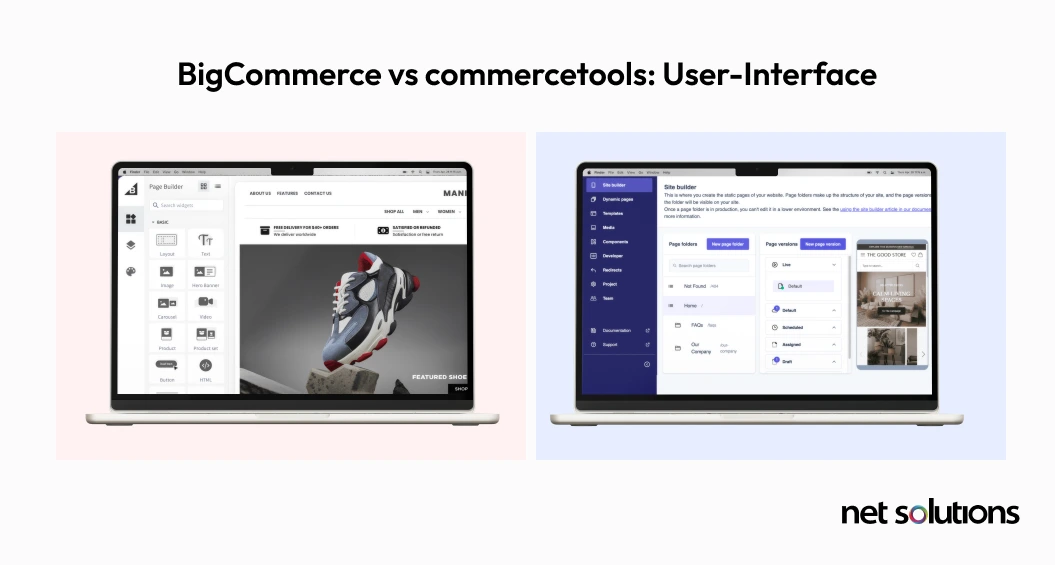
Customization options
The winner here is commercetools, whose composability is more mature and tech-agnostic. commercetools offers a number of built-in applications (components) for all projects (e.g. products, orders, customers) and additional options to build on top of the platform to further tailor the experience. commercetools Connect is an integration framework designed to help you integrate the capabilities you need, whether automation, AI or more.
For BigCommerce, you are tethered to using extensions for most customization, although this is changing as BigCommerce moves toward composability. With that said, while commercetools wins for depth of customization, BigCommerce wins for ease of customization.
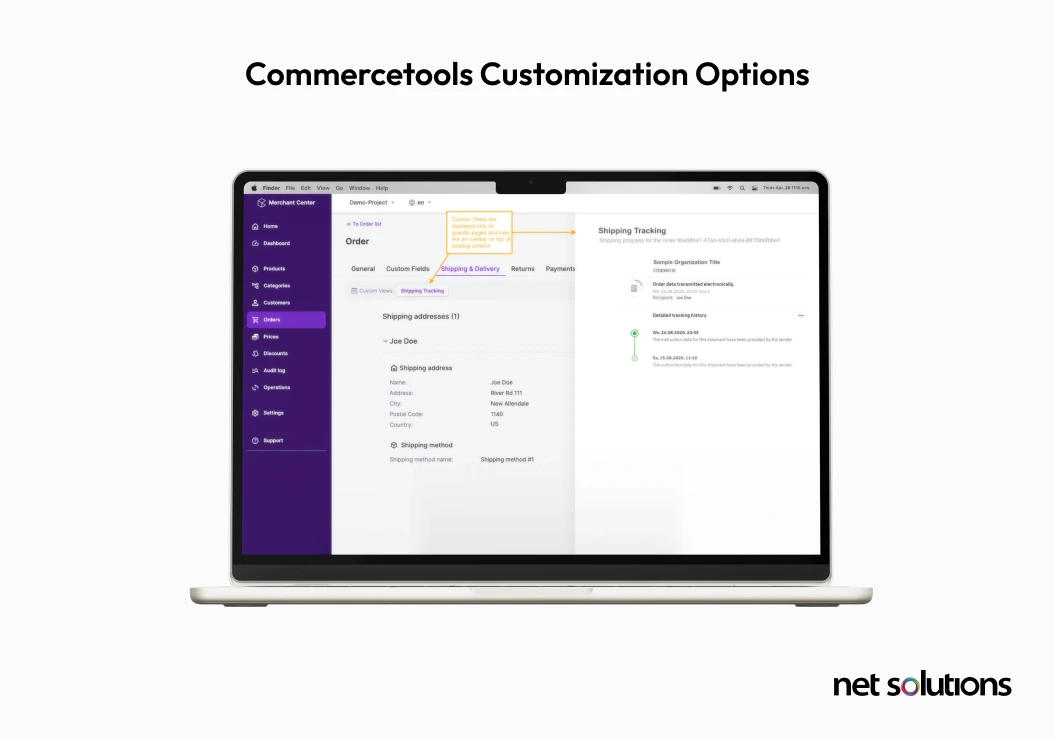
Extensions and integration possibilities
This is a tie, based on commercetools winning for greater extensibility (language + tech-agnostic), but BigCommerce winning for greater number of pre-available integrations.
As a composable solution, commercetools enables integration of specialized components or custom components whenever needed. commercetools lists 125 extensions and integrations in its marketplace to the 1000+ of BigCommerce, with custom apps and integrations made using BigCommerce’s SDKs and toolkits (not tech-agnostic).
Development duration
BigCommerce wins this hands down, with a strong history as an all-in-one SaaS solution and the recent launch of Catalyst, pairing best practice technology for headless storefronts with a no/low-code visual editor to help accelerate time to market.
commercetools suggests leveraging experienced developers and existing system integrations to help speed up time to market. Alternatively, commercetools offers a pre-composed solution (Foundry B2C or Foundry B2B) of store blueprints coupled with internal experts for self-launch in a matter of weeks and Frontend as a service, providing a hosted frontend solution.
eCommerce capabilities & functions
This is a tie, as both offer great starter capabilities, with different strengths: commercetools standing out for B2B and product catalogs and BigCommerce standing out for checkout flexibility and its new AI-powered semantic search capabilities (Enterprise plans only).
The storefront capabilities supported by commercetools includes support for complex catalogs, dynamic product discovery, pricing and promotions, checkout customizations, localization capabilities, advanced B2B2+ (inventory management, quotes, tailored pricing, B2B search and discovery, advanced product catalog and data models, business hierarchy support),
The storefront capabilities supported by BigCommerce include a scalable catalog, shipping, refunds and returns support, analytics, customer groups, native credit card vaulting for multiple gateways, tax support, coupons & discounts, faceted search, digital wallet support, drag-and-drop merchandising, multi-storefront, marketplace & social commerce support, B2B support (groups, purchase orders, custom and bulk pricing, quotes), support for POS, support for 100+ currencies.
Promotional and marketing features
BigCommerce and commercetools tie. Both platforms support discounts and promotions, have direct integrations to a variety of channels (e.g. marketplaces, social media), and strong SEO tools.
Payment methods and associated costs
The winner for this segment is BigCommerce. BigCommerce supports 65 leading payment gateways serving 230 countries and 140 currencies with no added transaction fees, but you may also qualify for decreasing rates with PayPal via Braintree that have been pre negotiated.
commercetools Checkout is a pre-composed solution that connects with payment service providers (as well as integrating with catalogs, order princessing, pricing, cart management), but only supports Adyen (including Apple Pay, Klarna, Google Pay + more) and PayPal as preliminary PSPs. Costs are pre-determined in client agreements with commercetools.
Search engine optimization (SEO)
The winner here is BigCommerce thanks to its new AI capabilities. Although both platforms support basic SEO capabilities such as SEO-friendly URL and metadata, BigCommerce’s new AI tool sets include AI-assisted capabilities to write meta titles and descriptions.
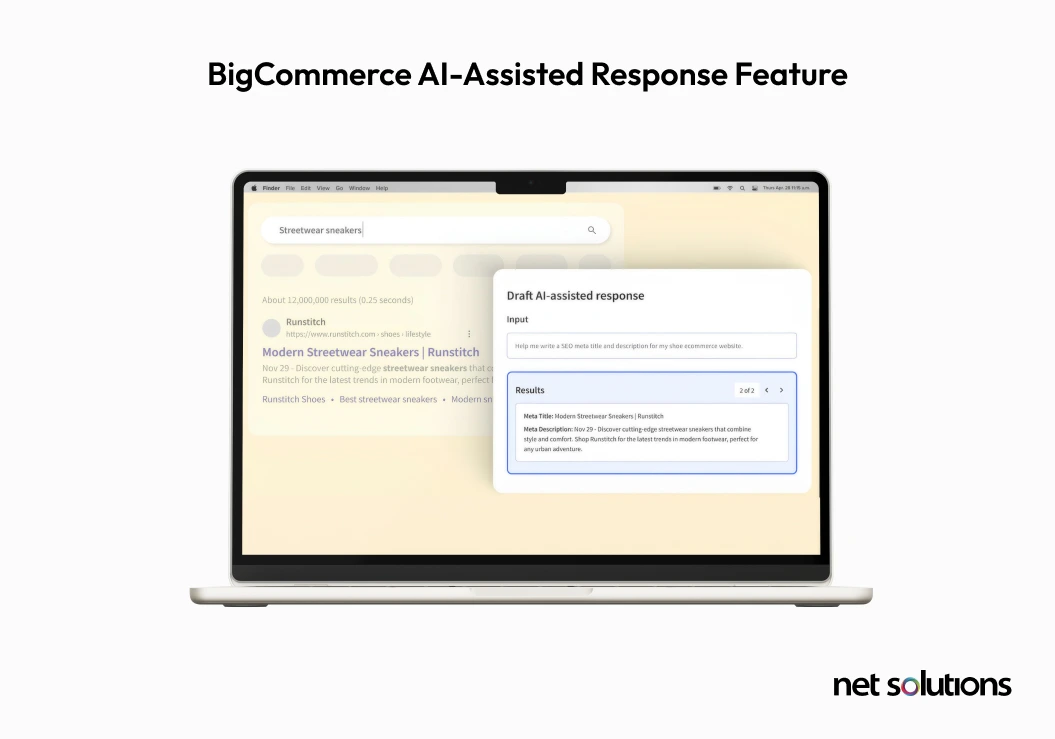
Support and assistance
Winner in this category is commercetools, although it’s a very close call. commercetools offers highly trained support depending on severity level, with 24/7 support and 60 minute maximum response time for an S1 incident. They also offer a premium support add-on that brings S1 incidents down to 20 minutes and offers a dedicated expert.
BigCommerce offers 24/7 technical support, also with the option to add-on support for account management, solution architecting, technical account management, implementation support, and catalog transfers.
Price overview
BigCommerce pricing is transparent, with no hidden costs, fees, or bandwidth overages, designed to draw in the small to medium sized business with more entry-level pricing options, with caps based on sales volume per year.
commercetools does not disclose its pricing levels, but offers on-demand pricing that scales as you grow. commercetools works directly with each business to come up with a pricing model, one may combine infrastructure cost and a variable fee per order.
We caution against directly comparing prices for these two platforms, as actual operating cost will depend on store size and capabilities needed and total eCommerce website cost includes many factors. While commercetools does not charge for integrating new capabilities, BigCommerce does.
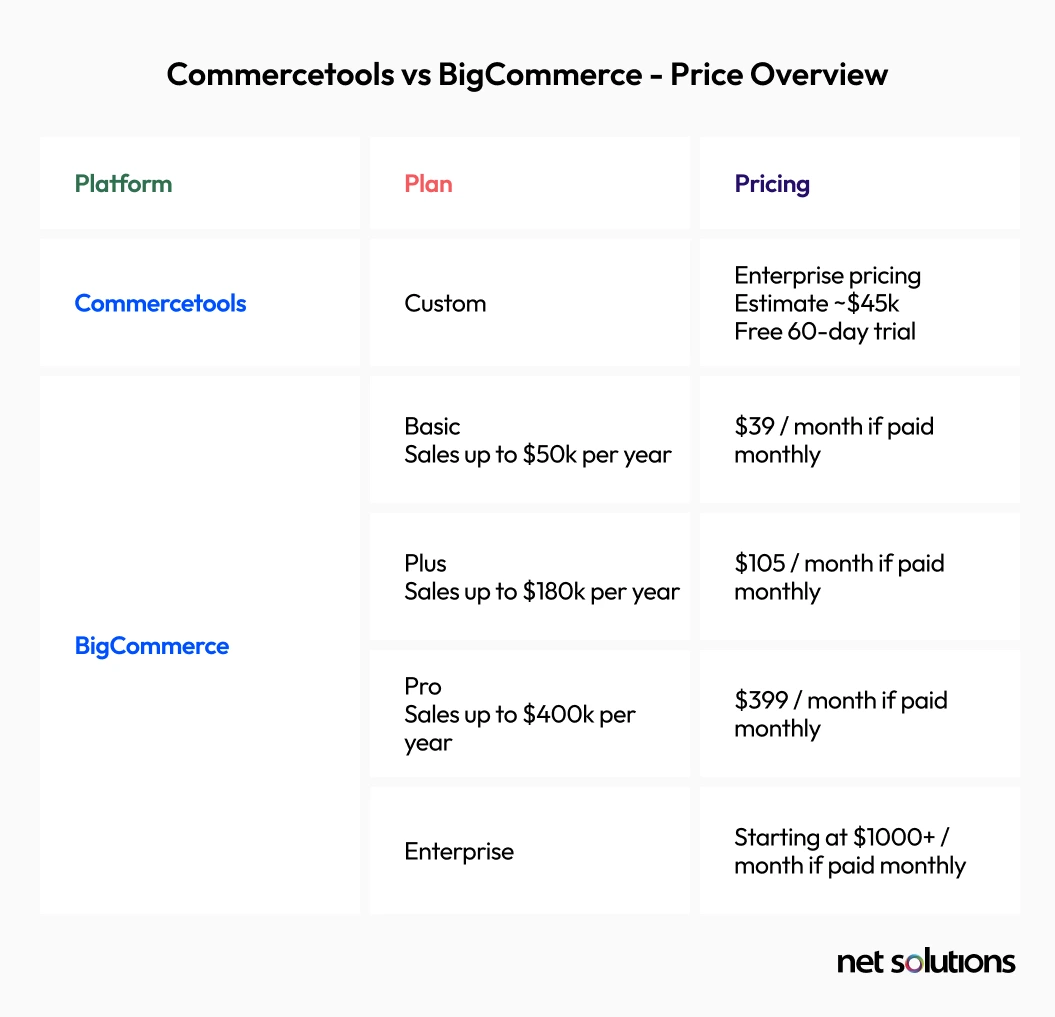
Learn more about BigCommerce pricing or, for a free open-source option, read our comparison on BigCommerce vs Magento.
BigCommerce vs. commercetools: What Users Have to Say
Although we try to be unbiased in all our comparisons, we know that sometimes the best reference is actual users. Here we’ve compiled some feedback from real reviews on G2:
What do users have to say about commercetools?
Here are some reviews from actual users of the platform:
Pros:
- “Their customer support team is easily reachable and very knowledgeable about the platform.” – Consumer Goods user
- “Commercetools is a very feature-rich digital commerce platform. Its support for MACH architecture has made it highly flexible and easy to integrate with our legacy systems. Its integration with payment solutions has made it a complete platform.” – Banking User
- “Easy to implement, easy to set up.” – Retail user
Cons:
- “Given its API-first and microservices-based approach, businesses often need skilled developers to fully leverage the platform’s capabilities, which can be a challenge for organizations with limited technical staff (fortunately not the case at us).“ – Michael, eCommerce lead
- “The pricing also needs to be more competitive.” – Banking User
- “It is so easy to customize that sometimes you can be a bit lost, but the customer sucess [sic] help you.” – Retail user
What do users have to say about BigCommerce?
Here are some real BigCommerce users and what they have to say:
Pros:
- “The platform’s scalability, with its ability to handle high-volume transactions without sacrificing speed or performance, has been a game-changer as our business has expanded.” – Deepak K.
- “It is easy to navigate, the online help is great especially for someone that is not technical.” – Louise M.
- “The B2B and multi-storefront features shine, the biggest advantage for a SaaS commerce platform.” – Brent
- “The ease of finding developers that are experienced with Big Commerce and the flexibility of the software environment.” – Food & Beverage user
Cons:
- “The backend interface is a little dated” – Brent
- “The difficulty of vetting the developers that I spoke with.” – Food & Beverage user
- “The customer groups should be across all tier levels, as well as save cart feature.” – Steven H.
The Bottom Line
Both commercetools and BigCommerce offer enterprises of various sizes the capability to get started with composable commerce. While commercetools is an established composable solution, BigCommerce has jumped ahead in its capabilities with its newly released AI tools and composable commerce capabilities, beefing up its ability to remain relevant to businesses and enterprises as they scale.
What is commercetools best for?
commercetools is ideally suited for:
- Large enterprises with complex needs across B2C and/or B2B+ markets
- Highly developed technical teams who are ready to jump into composable commerce and want a very customized solution
- Enterprises looking for comprehensive capabilities that are not tied to price tiers
What is BigCommerce best for?
BigCommerce is ideally suited for:
- Non-technical or small business users, to accelerate time to market with the base platform
- More technical users who want an alternative path to headless with the simplicity of a SaaS platform
- Small to medium businesses looking to get started
- Enterprises looking for a lower-cost platform with advanced AI capabilities
If you would like an expert opinion on whether commercetools or BigCommerce are right for your business, or you’re ready to execute on a plan and looking for UX design and development support to create a tailored eCommerce solution for your business, our team has more than 20 years of experience and first-hand knowledge of the leading eCommerce platforms. We’d love to help.

